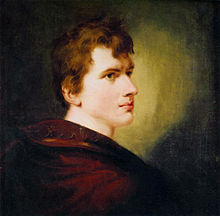Aloys and Rose
Aloys and Rose is an elegiac love story by Achim von Arnim , which appeared in 1803 in the third volume of the French Miscelles , edited by Helmina von Chézy , at Cotta in Tübingen.
content
After the fight against Napoleon's Helvetic Republic at the end of 1802, Aloys was imprisoned at the Aarburg Fortress. His bride Rose ended up in the Valais annexed by Napoleon . The young girl is accompanied by an old maid who wants to kill the French "with rat poison". The father, a player and friend of the French, had fled with Rose by night and in fog from Vaud to Valais. He had secretly bought a small inn there. The father has since passed away. The newcomers are not loved by the Valais. But the mother wants to gain a foothold. Rose is supposed to marry a wealthy local. The bride of the freedom fighter Aloys is reluctant. From brief remarks and also from the sky-blue papers that Rose presents to the narrator, this and that emerges from the story of the bride and groom. The fathers of the bride and groom were regimental comrades. The two men had promised each other that they would "marry off" their children. Aloys' father had canceled the marriage at short notice when Rose's father had turned completely to the French. Aloys and Rose, on the other hand, also connected by “their common preference for old books”, had initially stuck together. But now Aloys, desperate during the imprisonment, releases the bride in a "letter of rejection". Rose hopes that the narrator, a traveler who has stopped at her mother's inn, can bring her news of Aloys.
Self-testimony
About the form: In the subtitle Achim von Arnim is the editor of the diary of an anonymous first-person narrator, under which the reader can introduce himself to Alois von Reding. The first-person narrator uses letters to the addressees in these diary pages. Achim von Arnim writes to Brentano : "... where you stand, you, Clemens Brentano, have to read."
reception
- Riley discusses the text.
- Renate Moering commented on the short story. The reason for elaborating the story was the occupation of Valais by Napoleon and Reding's arrest.
literature
- Helene M. Kastinger Riley : Achim von Arnim . rowohlt's monographs edited by Kurt Kusenberg . 158 pages. Reinbek near Hamburg in July 1979, ISBN 3-499-50277-1 .
expenditure
- Hans-Georg Werner (Hrsg.): Ludwig Achim von Arnim: The stories and novels. Based on the three-volume edition 1962–1965 obtained by W. Migge. Four volumes. Volume 1 (1067 pages): Hollin's love life . Aloys and Rose . The winter garden. The collection of novels from 1812. The billeting in the rectory . Mrs. of Saverne . The Christmas exhibition. The great invalid at Fort Ratonneau . Strange encounters and reunions . The broken stagecoach . Juvenis. Volume 2 (811 pages): Prince Ganzgott and singer Halbgott . The Majorate Lords . Owen Tudor . The church order . The disguises of the French court master and his German pupil . Raffael and his neighbors . Country house life. The marriage smithy . The Count Palatine, a gold washer. Volume 3 (607 pages): Poverty, wealth, guilt and penance of the Countess Dolores . Volume 4 (645 pages): The Crown Guard . Insel-Verlag Leipzig, 1981–1984.
Quoted text edition
- Renate Moering (Ed.): Aloys and Rose. French miscelles from Valais. From the diary of a hipochondrial traveler. Pp. 11-49 in Achim von Arnim. All the stories 1802–1817. Vol. 3 in: Roswitha Burwick (Hrsg.), Jürgen Knaack (Hrsg.), Paul Michael Lützeler (Hrsg.), Renate Moering (Hrsg.), Ulfert Ricklefs (Hrsg.), Hermann F. Weiss (Hrsg.): Achim von Arnim. Works in six volumes. 1398 pages. Deutscher Klassiker Verlag Frankfurt am Main 1990 (1st edition), ISBN 3-618-60030-5
Individual evidence
Source means the quoted text edition
- ↑ Riley, p. 36, 1. Zvo
- ↑ miscellaneus (Latin) = mixed, all sorts
- ↑ Source, p. 1031, 3rd Zvu
- ↑ Source, p. 1026, 6. Zvo
- ↑ Source, p. 1032, 12. Zvo
- ↑ Source, p. 14, 6. Zvo
- ↑ (Rose was brought up under Lavater's influence ) (source, p. 17, 21. Zvo).
- ↑ Source, p. 1029, 5. Zvo
- ↑ Riley, pp. 36-37
- ↑ Source, pp. 1026-1041
- ↑ Source, p. 1028, 11. Zvu
